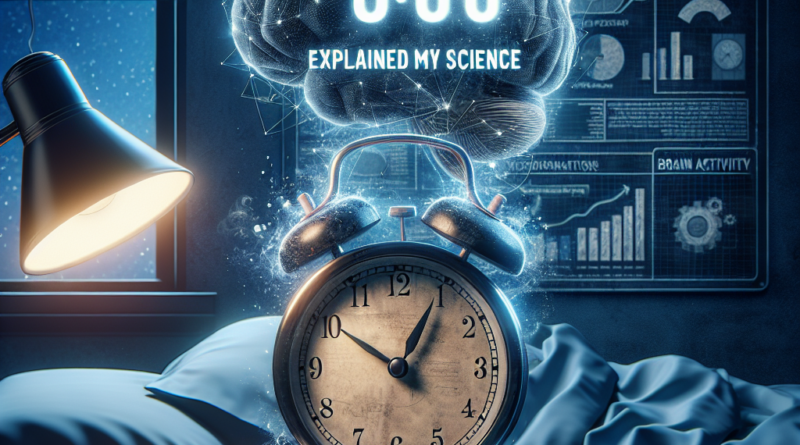Why Do We Wake Up at 3 AM? Science Explains
Waking up at 3 AM: A Common Experience Explained
Waking up at 3 in the morning (or at night, depending on one’s perspective) is an experience that many have gone through, and for some people, it can take on unsettling connotations.
In different cultures, this hour has been associated with supernatural phenomena or superstitions.
The 3 AM Mystery
In Anglo-Saxon tradition, 3 AM was considered the “witching hour,” a moment when it was believed that witches, demons, and ghosts would make their appearance.
However, beyond popular beliefs, science offers much more concrete and reassuring explanations for these nighttime awakenings.
The Science Behind 3 AM Wake-Ups
One of the main reasons we wake up in the middle of the night is linked to sleep cycles.
Human sleep is divided into phases, including non-REM sleep and REM sleep (“Rapid Eye Movement”).
The early part of the night is dominated by non-REM sleep, characterized by light sleep that later evolves into deep sleep.
Towards the second half of the night, there is REM sleep.
This phase is when the brain is extremely active, and dreams are vivid.
We don’t have just one sleep cycle, so this repeats several times during the night.
It is no coincidence that around 3 AM, we are often in a REM sleep phase.
Simply put, it is during this more vulnerable phase to awakenings that we may find ourselves waking up, often feeling groggy.
In addition to sleep cycles, there are other factors at play.
Cortisol levels, the stress hormone, also play a significant role.
Around 2 or 3 AM, our bodies experience a slight increase in cortisol levels.
This natural increase can contribute to sleep interruption.
As Professor Giuseppe Plazzi, director of the Sleep Center at the Irccs in Bologna, points out:
“The central awakening in the night is actually part of our DNA.”
There may be some who see it as an evolutionary legacy, linked to when our ancestors woke up during the night to hunt and protect the family from predators.
Other Factors Influencing Nighttime Wake-Ups
However, biology is not the only factor determining these awakenings.
Various lifestyle factors, such as stress, diet, and the use of electronic devices before bedtime, can influence sleep quality.
For example, Professor Plazzi highlights how “stimulation from artificial light inhibits the production of melatonin,” the hormone that regulates our sleep-wake cycle.
Eating too late, consuming alcohol, or engaging in physical activity at inappropriate times can further complicate maintaining continuous and restorative sleep.
Let’s delve into the expert’s opinion:
“The main factors are related to mood disorders, such as anxiety and depression.
Then there are more organic disorders, including gastrointestinal issues.
For example, gastroesophageal reflux is one of the first (…).
And again, alcohol consumption; or drinking too much water before bedtime: after three hours of sleep, it causes the urge to wake up to empty the bladder.”
Palazzi further emphasizes:
“Additionally, there are other factors related to endocrinological mechanisms.
For example, eating too much in the evening stimulates insulin, leading to increased nighttime appetite.
And then, engaging in late-night physical activity does not promote lasting and restorative sleep.
Natural or Unnatural?
In summary, waking up at 3 AM is nothing supernatural: it is the result of a complex interaction between our sleep cycles, hormone levels, and our lifestyle.
There is also a specific medical condition for those with chronic insomnia:
“There are primary insomnias, likely caused by a dysfunction of the sleep regulatory system, which, if not promptly and correctly treated, are likely to become chronic.”
So if you wake up at 3 AM occasionally, don’t worry: it’s nothing out of the ordinary.
However, if these awakenings become frequent and disrupt sleep quality, it is advisable to consult with a specialist.
Whether natural or not, if you want to avoid waking up in the middle of the night, there are some precautions you can take to improve the quality of your sleep.
It may sound mundane, but it is essential to maintain a regular sleep routine, going to bed and waking up at the same time.
Ensure that the bedroom is dark and quiet, creating an ideal environment for rest.
Moreover, since artificial lights inhibit melatonin production, experts advise avoiding the use of electronic devices before sleeping.
Scrolling before bed is a widespread habit and a true addiction for some, but is a great enemy of sleep, as are heavy meals and alcohol consumption in the evening hours.
Finally, reducing stress with relaxation techniques (such as meditation or mindfulness) can make a significant difference.
And if all else fails, it is advisable to seek medical help.




